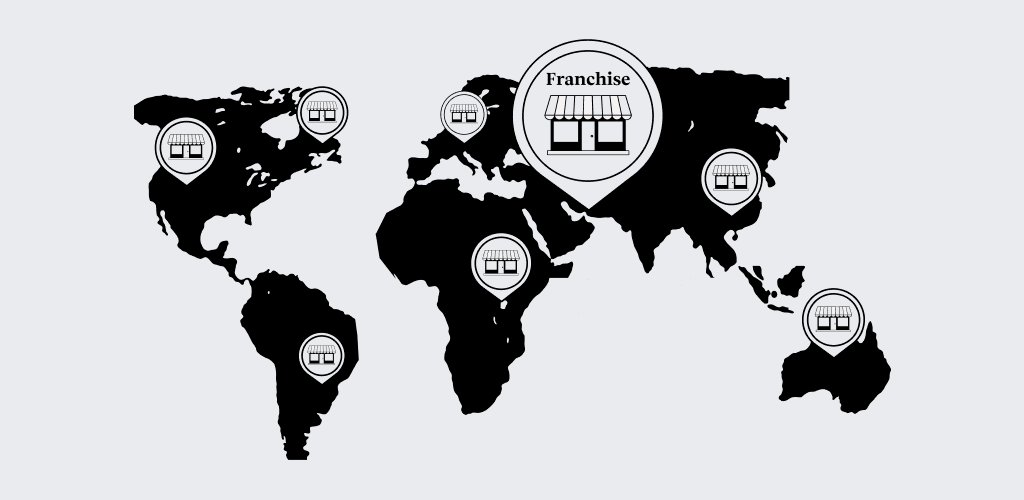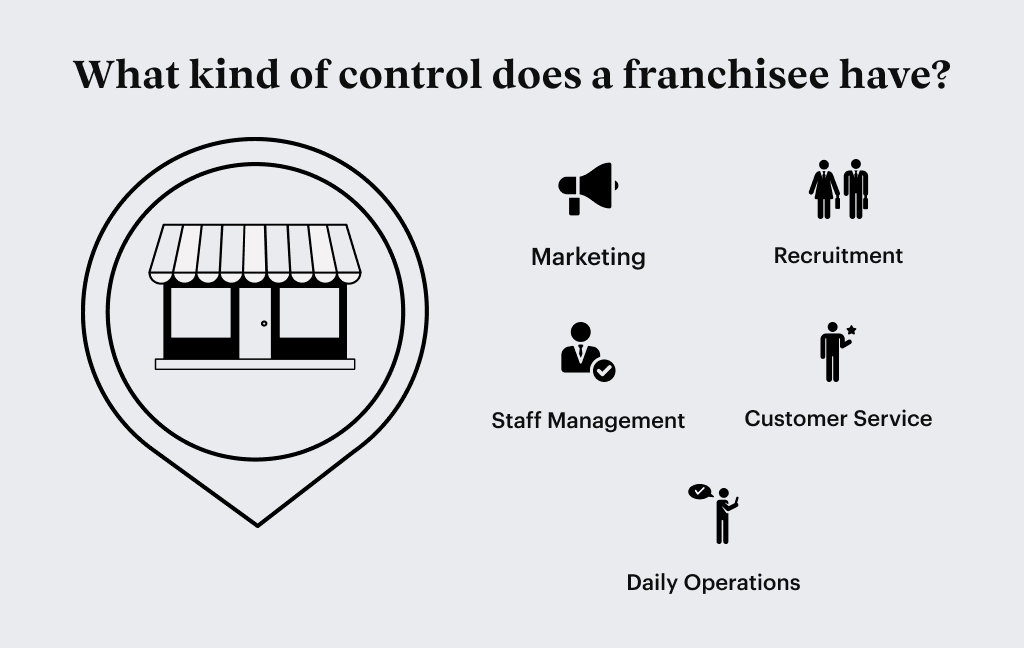Qvalon Blog article content
By: Jul Domingo
Have you ever considered franchising a profitable business?
Well, it is. Compared to independent businesses, the franchise success rate is approximately 8% higher. With a franchise, you gain the benefits of running a small business and a more established company backing you up.

A tried-and-tested franchise system will be laid out for you, so you won’t have to figure things out on your own.
But most people dismiss the idea of franchise ownership because they think they won’t be able to control their business. That simply isn’t true.
You need to be aware of certain limitations since you’re operating under a franchise agreement, but that doesn’t mean you have no control over the franchise operations.
What is a franchise?
A franchise is a license that allows franchisees access to a franchisor’s confidential information, such as:
-
proprietary knowledge
-
processes
-
trademarks
-
associated brands
Under a franchise agreement, you can sell the franchisor’s products and services, provided that you have invested in the franchise and paid the annual fees. Conversely, franchises typically have an established brand, streamlined management practices, and ongoing support.
Before we discuss who gets control of the franchise operations, let’s clear up some terms about the people involved in the franchise model.
The difference between a franchisor and a franchisee
The franchisor owns the trademark and business model. Upon paying the upfront fee and continuing royalties, the franchisor grants the franchisee the rights to use the trademark and business model.
The franchisee is often a small business owner who has purchased the franchisor’s name and can run the business using brand standards, operations, and so on.
Legal considerations of a franchise
If you’re wondering what type of relationship a franchisor and franchisee have—they have a binding contract.
This agreement serves as the pillar of the collaboration. And more often than not, the terms are iron-clad to protect both parties and to accommodate future events.
The contract often features the following provisions:
-
trademark license grant
-
operation of the franchised business
-
Invoices, payments, etc.
-
term of the rights
In terms of franchise control, you can take a look at the contract where you can see the following information:
-
restrictions on products and services
-
reporting requirements
-
post-termination obligations
-
competition restrictions
Does the franchisee have full control?
The answer is no, but they are not completely powerless. Franchisees can choose how they want to run their business since the franchise system doesn’t cover every aspect of running a successful business.
Franchising is based on a system that the franchisor has already set up—and it works. Thus, franchisees must comply with both the franchise agreement and the franchise operations manual to achieve a comparable level of performance.
Moreover, these materials safeguard the whole franchise. Product and service expectations from each franchise are the same. Bringing your flair will not distinguish your franchise—it might just disappoint.
As a franchisee, you cannot change products and services according to your own preferences or interpretation of market conditions. It’s the franchisor’s responsibility to determine the company’s structure and products.
Some people might see it as a limiting factor, but it’s the reason many franchise owners have found success without a business background. The parent company lends you its reliable methods to help you along the way. Here are some advantages franchisees can enjoy for being part of a bigger brand.
-
Brand recognition
-
Franchisor training
-
Proven technology and method
-
Support from the headquarters
What kind of control does a franchisee have?
It might not be as much as what independent business owners have, but safe to say—franchise owners are business owners. It’s the reason why franchises differ in profitability. The secret lies in management.
Here are some areas of your business that you can tweak to your heart’s content.

Marketing
Yes, you need to have enough money to cover franchise fees, but how you handle your money is up to you—especially when it comes to marketing. You already have a head start because carrying the franchise’s name comes with brand recognition, but you can still work on expanding your reach.
For instance, participating in local fairs and sponsoring community events is a good marketing strategy to draw attention to your business. And you can enjoy the autonomy of running the whole thing - from talking to the organizers, setting up your booth, and everything else you need to pull this off.
Recruitment
Choosing the people you work with isn’t a walk in the park. The truth is, great help is not easy to find - imagine looking at resume after resume just to find the right candidate. But this works to your advantage versus working with individuals you don’t get along with.
Regardless of how challenging it is to build a core team initially, you get to pick who you work with - not the parent company. You also determine the pay packages and salary estimate, from the highest salary position down to the lowest salary position
Staff management
Franchisors provide training tools and classes to you and your personnel, which you should take advantage of. They’re great for your franchise and your staff’s personal growth.
You can also look into other types of training and incorporate anything that interests you into your own curriculum. Employee development enables workers to acquire new skills and knowledge, enabling them to take on more complex tasks and think creatively.
Your reward system also depends on you. If you feel like giving top performers additional cash compensation or paid time-off, your staff will know it’s from you and not the franchisor.
Customer service
Customer service is an important aspect of your business worthy of attention. You carry the franchise’s name, like other franchisees.
Imagine if one branch messes it up, it’ll drag down the others. Word travels fast through social media, after all.
Luckily, you’re in charge. So you can ask the frontline team and perform audits on what you can do to make sure your customers get the best service possible.
Daily operations
Monitoring the comings-and-goings in your franchise is a part of your job, so expect to take on many responsibilities.
Sure, there are franchise systems in place. A franchise restaurant, for example, has to stick to preparation and cooking protocols handed by the franchisor. But everything else will fall on your lap, such as arranging supplies, contacting vendors, dealing with payroll, and so much more.
Often, you can invest in management software, such as QVALON, that helps streamline your operations through checklists and surveys, so you’ll have time to grow other facets of your business.



